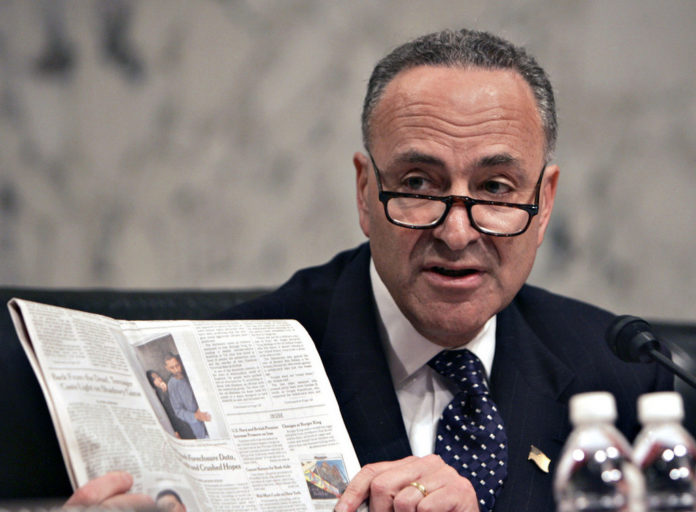
Two U.S. senators who pushed legislation last year for tariffs on Chinese imports predicted last week that a new measure aimed at forcing China to raise the value of its currency will pass Congress by next year.
Charles Schumer, a New York Democrat, and Lindsey Graham, a South Carolina Republican, said they are drafting a new, scaled-back measure and will unveil it within the next few months. The senators said they have dropped the threat of import tariffs because it runs afoul of global trade rules.
The tariff threat “was a shot across the bow,” Schumer testified to the Senate Finance Committee last Wednesday. “Strong and effective legislation is likely to pass with a veto-proof margin” this year or next, he said.
Late last year, Schumer and Graham withdrew legislation that would have imposed a 27.5-percent tariff on Chinese imports and pledged to develop a new approach with U.S. Sens. Max Baucus of Montana and Charles Grassley of Iowa, the top Democrat and Republican, respectively, on the Senate Finance Committee.
Since then, congressional unhappiness with China has grown, the lawmakers said. The U.S. trade deficit with China reached a record $232.5 billion last year. The lawmakers and many economists say China’s yuan is undervalued by as much as 40 percent, and its appreciation since July of 2005 hasn’t kept pace with economic growth in that country.
An undervalued yuan makes Chinese products cheaper on world markets.
In 2005, Graham and Schumer forced a procedural vote in the Senate, then controlled by Republicans, on their tariff proposal. They got 67 votes for their measure, a level of support Graham said shocked them. New legislation that doesn’t threaten such draconian measures could gain even more votes, Graham said.
Their effort is aimed as much at the Bush administration as it is at China, they said.
“In my view, the Bush administration cannot be counted on to protect American industry and American workers from China’s unfair trade practices,” Schumer said.
One aspect of the legislation would rewrite almost two- decade old rules that govern how the U.S. Treasury Department establishes whether a country is deliberately keeping its currency weak to prop up exports. The department has refused to cite China as a “currency manipulator,” to the ire of some lawmakers.
U.S. automakers, meanwhile, want Japan criticized for what they call a weak yen.
“We need to overhaul our laws so that the Treasury Department is generally empowered to respond more forcefully to significant currency imbalances,” Grassley said. “I intend to work on legislation that is not specific to any particular country or currency. It’ll be broader than that.”
Another lawmaker isn’t waiting for Grassley, Schumer and Graham.
Michigan Democratic Sen. Debbie Stabenow proposed a measure last week that would require the Treasury Department to work with Japan to begin selling its official reserves of $644 billion in U.S. debt. By holding those reserves, Japan is keeping its currency undervalued, U.S. automakers say.
“It’s time for the administration to stop condoning this policy,” Stabenow said in a statement.












